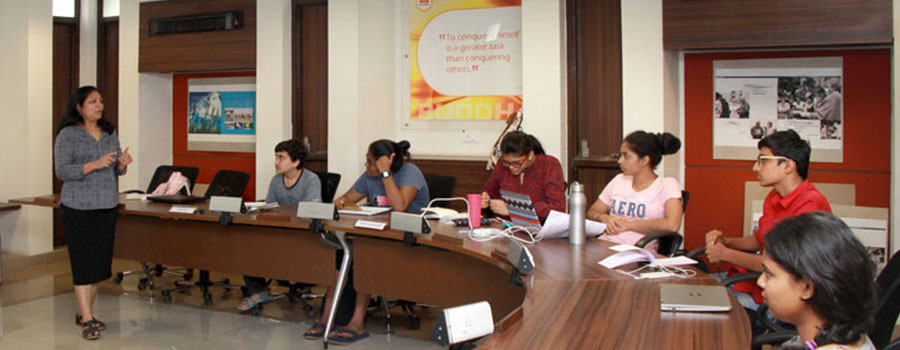As an endeavor to provide high school students with an opportunity to experience Liberal Education on a University campus, FLAME University conducted its inaugural Summer Immersion Program from June 4 to June 18, 2017.
High school students (Std. X, XI and XII) from different parts of the country participated in the program. The formal inauguration of the program took place on Monday, June 5, 2017.
The program attempted to strengthen skills of the participating students through a mix of academic and non-academic modules, thus laying a strong foundation to succeed in college and beyond. The inter-disciplinary curriculum emphasized critical thinking, research, engagement with diverse ideas and perspectives, while inculcating the values of leadership, teamwork and effective communication. The academic modules were contemporary and relevant.
Some of the academic modules included:
- Contemporary Issues entailing a comprehension of ‘social issues’ through a sociological lens.
- Film Appreciation leading students through an understanding of ‘cinema’, the need for ‘appreciating’ it with a brief history of cinema and key movements in a socio-cultural context.
- Reading Literature where students attempted to understand what, why, and how do we read? This involved the scope of literature, literary and popular writing and literary techniques and devices.
- Business and Entrepreneurship introduced students to the world of business by looking at the fundamentals of business management and the business environment (macro and micro).
- Introduction to Cultural Studies led students through an understanding of cultural studies, the historical context and significance of pop culture and the deconstruction of cultural artefacts.
- Environmental Studies exposed students to new ideas in evolution and environmental policies. Students also understood how to view environmental changes from satellites.
Non-academic modules included skill-based modules such as:
- Public Speaking and Debate took students through a journey of different aspects and skills related to public speaking to enable students express themselves with clarity and conviction.
- Leadership and Group Dynamics encouraged comprehension of human behavior in a group context.
- Critical Thinking showcased the ability to think more clearly, rationally and reflectively.
- Writing workshops were aimed to expose students to basic skills in argumentation, analytical writing and to develop their abilities to construct a logical, coherent essay.
- Painting focused on techniques and applications of water color paintings.
- Sculpture sessions were based on the belief ‘An artist is not a special person; each person is a special kind of artist’ (Ananda Coomaraswamy, art historian, philosopher).
- Dance entailed a small composition with emphasis on space, rhythm, interpretation of words through gestural language based on contemporary Indian music.
- Theatre exposed students to a basic understanding of theatre by introduction to basic theatre, skills of voice, body and improvisations.
- Sports’ importance to holistic development of individuals was discussed and students were exposed to Yoga, Zumba and fun games.
In addition to the above, other major highlights of the program were sessions and events that were instrumental in shaping students in myriad ways such as:
- Career counselling that guided students through various courses, preparations and requirements.
- Cognitive biases in human behavior which helped understand the process of evolution that has endowed the human race with arguably the most complex brain.
- Organic farming where students were exposed to an understanding of soil testing and bio fertilizers.
- Debate and presentation provided a logical conclusion to the sessions on Public Speaking and Debate.
- Street plays where social issues were expressed through the medium of street plays had the aim of sensitizing oneself and the others around to diverse issues of concern. Students were divided into groups and came up with plays based on themes like women’s empowerment, teen depression and corruption.
- Book Review where students reviewed sections from two books, applied their learnings in the sessions on Reading Literature and presented the same.
- Poster Exhibition involved using the visual medium coupled with verbal interactions on themes like ‘Pluralism’ and ‘Change’.
- Field trips were organized to get familiarized with the surroundings of Pune – Aga Khan Palace, Shaniwar Wada and Dagdushet Temple, Yusuf Meherali Centre, Panvel, Dist. Raigad. Students also went on a trek to Sinhagad Fort, Pune.
- An interaction with Teach for India (TFI) and Children’s International Summer Villages (CISV) was organized to understand the kind of work that these organizations are involved in and most importantly, the significance of community outreach.
All these sessions were conducted by reputed and renowned faculty. Additionally, an interaction with alumni and current students of FLAME elucidating the role of liberal education was held. Dr. Sonam Mansukhani, Chair of the Summer Immersion Program, also provided a platform to students entitled ‘Reflections’ to exchange notes on the academic output.
The program concluded on Sunday, June 18, 2017. Dr. Sonam Mansukhani gave an overview of the program to an audience comprising of parents, participating students and other members from FLAME University, followed by certificate distribution by Dr. Santosh Kudtarkar.


